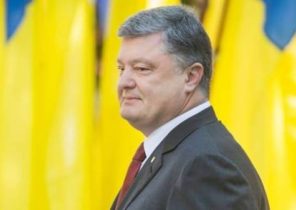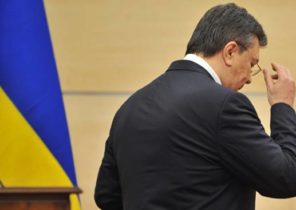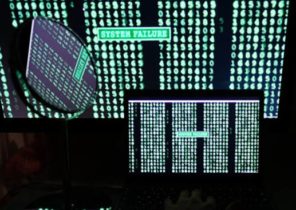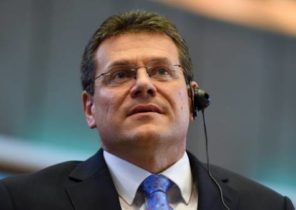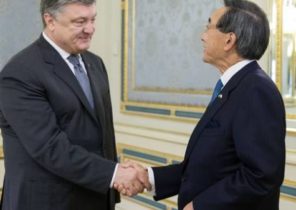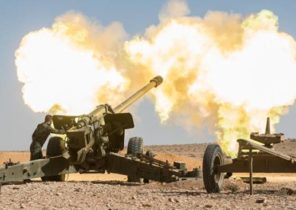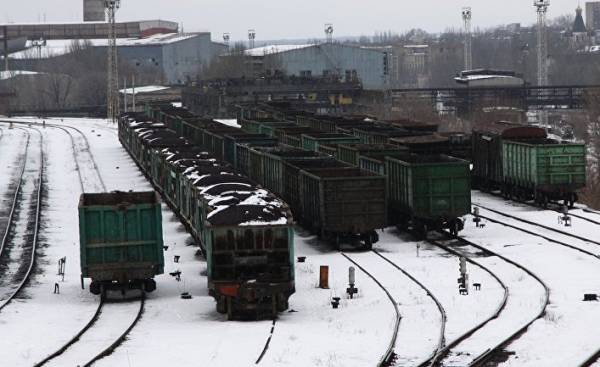
“This is wrong: trading with the occupiers,” — said Dmitry Kravchenko.
Snow. He pulls the hood tighter green soldier’s jacket.
He and a dozen activists put a big military tent at a railway crossing on the outskirts of the Eastern Ukrainian town of Bakhmut. Of the tent and waving the Ukrainian flag and the red and black flag of the Ukrainian nationalist movement OUN.
“Europe has imposed economic sanctions against Russia and suffered because of this economic loss. They also imposed sanctions against Pro-Russian separatists and other terrorist organizations, occupying the territory of Ukraine. And Ukraine continues to trade with them”, — said in a subdued Dmitro Kravchenko.
“That’s why we’re here, we want to end the trade, which gives the separatists the ability to conduct a war against us”.
They organized a blockade in three places.
“Two here in Donetsk region and one in Luhansk, far away in the North. After we began the siege, was stopped two trains”.
But Dmytro Kravchenko understands that the trains with coal just laid back waiting for clarification.
Blockade of trains with coal from the so-called “people’s republics” the separatists in the government-controlled areas, could develop into a very complex issue for the Ukrainian government and President Petro Poroshenko.
This week the government decided to declare a state of emergency in the energy sector, because the lack of coal soon could cause problems for coal-fired power plants in Ukraine. They still depend on Donbass coal.
“Actions aimed at stopping the supply of coal, are a destabilizing factor,” said President Poroshenko on Thursday, adding that under the threat there were 300 thousand jobs in the country.
The blockade stopped the transportation of coal
However, there are no signs that pointed to the fact that activists can easily give up.
On the outskirts of Novgorodska, just West of Bakhmut, runs the Taras Black activist of the Ukrainian nationalist organization “Right sector” (a terrorist organization banned in Russia — approx. ed.).
Along with a group of 10-15 men he put the tent next to railroad, running from Konstantinovka in the North to the South in Yasinovataya from the area under the control of the government, in the part of Donbass, which is controlled by Pro-Russian separatists.
“We are here to monitor the situation” diplomatically recognized Taras in conversation with NRK.
But their action has led to the fact that in the last week it has not made any freight train. And the blockade of transportation of coal gradually begin to notice on both sides of the front.
On Friday, the Internet newspaper “Ukrainian Pravda” reported that the ISD closes its factory in Alchevsk, located deep in the territory controlled by the separatists, because transport across the front line ceased.
This region is one of those in Europe, most richly endowed by nature, so it is also the most populous on the continent.
Or was.
Now millions of people left what is currently the only theater of war in Europe, where coal has also become part of the conflict.
Taras, who himself hails from the city of Rivne in Western Ukraine, is not much to say about what he knows about the transportation of coal from separatist-controlled “Donetsk people’s Republic” to Ukraine, he does not want to talk about what they will do if the freight train will appear.
The blockade of supplies of coal from the separatists was the internal conflict in Ukraine, which can quickly cause an explosion and threaten the fragile unity in the country, which is fighting against separatists in the East.
The government condemns, but takes a wait and see attitude
“We must remember that under the control of separatist areas in the East part of Ukraine,” says Ukrainian Deputy Prime Minister Ivanna klympush-Tsintsadze in an interview with NRK. It protects trade, which continues across the front line — at a time when the soldiers continue to shoot and kill each other.
Klympush-Tsintsadze is one of the closest supporters of the Ukrainian President Petro Poroshenko, she believes that even in a conflict situation it is important to maintain contact across the front line.
She says that it is about the production of Ukrainian coal, the company who own the mine and get the coal, pay taxes in Ukraine.
— But are you ready to send the police to stop the blockade?
Is a very difficult question — answers Deputy Prime Minister Ivanna klympush-Tsintsadze. — You must not forget that these actions are part and members of Parliament, she says.
However, she stressed that she and the government generally believe that these actions are wrong. There are rumors that they are ready to remove the activists by force.
Dangerous situation
“But this means that what is happening today, can also threaten the fragile political stability in Ukraine” — the known Ukrainian political analyst Volodymyr Fesenko.
He meets with NRK on the Maidan, the large square in the center of Kiev, where there were revolutions in the country and in 2004 and in 2014.
“What is happening around the blockade of coal supplies, says the political situation in Ukraine in General. About the war, about the economy and politics, the fight against corruption… This suggests that our country is not United,” — says Volodymyr Fesenko.
He believes that the blockade is very dangerous that it can quickly lead to demonstrations and clashes here on the Maidan.
“Blockade leads to the intensification of the fronts in the Ukraine, it reinforces the extreme point of view in the conflict,” — says Volodymyr Fesenko.
He is very afraid of what might happen if the government fails to solve the problem peacefully.
The authorities are corrupt
“Clearly, the government is against what we are doing,” says I Dmitro Kravchenko around the campfire, diluted near the railway in Bakhmut in the Donbass.
President Petro Poroshenko is himself an oligarch, a businessman, profiting from the coal trade with the separatists, or the occupiers, as he calls them.
Behind him stands the richest man in Ukraine, Rinat Akhmetov, who owns factories and mines on both sides of the front line.
“Ukraine pays 500 hryvnia or almost 150 NOK per ton of coal, while consumers in Ukraine pay for coal is 1800 hryvnia. Where do you think happens to the money?” — asks Dmitro Kravchenko, who believes that to sell coal through the front line is immoral and serves as an example of corruption in his home country.
Well-armed Ukrainian police came into the areas of Donbass, which organized the blockade, but still kept at a distance.
A few kilometers from where we are, hear the sounds of shooting. The conflict in Ukraine — a complicated matter. Few believe that he may soon be resolved.
New peace talks
On Saturday, the foreign Ministers of Russia, Ukraine, Germany and France held a meeting in the framework of a large international conference in Munich.
Russian foreign Minister Sergei Lavrov reiterated the demand that the Ukrainian government to find a solution, it should negotiate directly with Pro-Russian separatists. Ukraine has so far refused to do so.
However, parties agree that everything possible should be done to a new agreement on the ceasefire, which should step into force on Monday 20 February was as efficient as possible.
“I believe that the key to resolving conflict is entirely in Moscow with President Vladimir Putin,” — said Ukrainian Deputy Prime Minister Ivanna klympush-Tsintsadze in an interview with NRK.
“Russia must withdraw its troops from the Donbass and force the separatists to agree to free elections under international control”.
On Friday, the Ukrainian authorities reported that within 24 hours he lost three of his soldiers. On Saturday, the defense Ministry of Ukraine wrote on his page in Facebook that on Friday morning “only” four soldiers were wounded.


